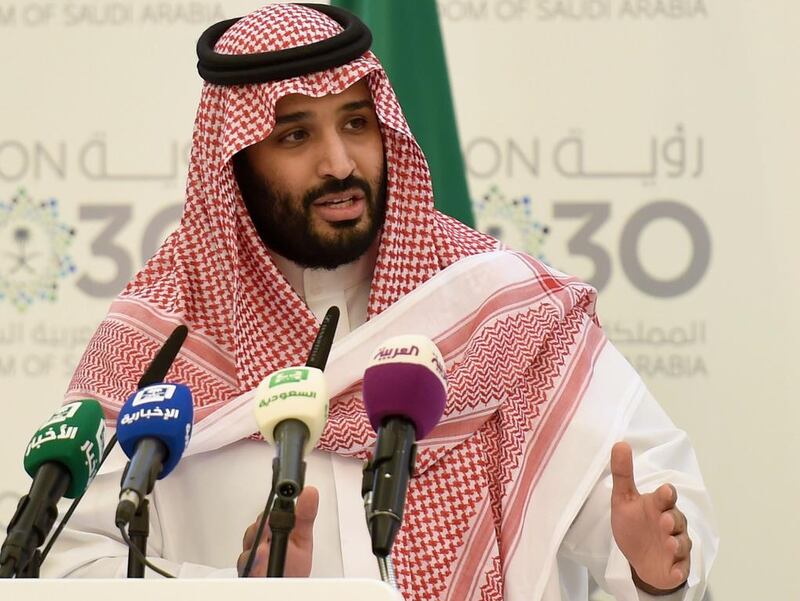Saudi Arabian Crown Prince Mohammed bin Salman's official visit to Britain, which starts on Wednesday, is a vital milestone on the road to his efforts to initiate wholesale economic and social reform in his country.
Since being appointed by his father, King Salman, last June, the 32-year-old Crown Prince has been charged with making radical changes to the kingdom's conservative outlook.
And Prince Mohammed regards maintaining a close and constructive relationship with the UK as being vital to the reform programme's chances of success, as he made clear when, prior to his arrival in London, I had an exclusive interview with him for the Daily Telegraph at his impressive residence in the upmarket Riyadh suburb of Irqah.
“After Brexit, there will be huge opportunities for Britain as a result of Vision 2030,” said Prince Mohammed, referring to Saudi Arabia’s ambitious programme to diversify the country’s economy away from its traditional dependence on the oil sector.
“The relationship between Saudi Arabia and Britain is historic, and goes back to the foundation of the kingdom. We have a common interest that goes back to the earliest days of the relationship.”
Vision 2030 forms the centrepiece of his reform programme, whereby he aims to diversify into new industries and technologies, thereby helping the country to become economically more self-sufficient.
The economic reform programme, moreover, is widely regarded as being the driving force behind an equally ambitious social agenda, one where the traditional influence of the country’s conservative-minded clerical establishment is replaced by a more liberal approach, one that is more cognizant of women’s rights.
“We believe that Saudi Arabia needs to be part of the global economy,” Prince Mohammed told me. “People need to be able to move freely, and we need to apply the same standards as the rest of the world.”
_______________
Read more from Opinion
[ Iraqi youth are reconnecting with the Arab world through their love of football ]
[ The lies and self-deceptions at work within Israel's 'moral' army ]
[ Are you being judged when you enter luxury stores? ]
[ Four years on, the tragedy of MH370 could happen again ]
[ The UAE must tell the world about its generous overseas aid programme ]
_______________
He explained that he sees the social reforms he is driving through as being part and parcel of his efforts to make the kingdom better aligned with the rest of the world. Indeed, most of the international headlines concerning the kingdom at present tend to relate to the new opportunities being afforded the country's womenfolk, from being allowed to drive their own cars to running their own businesses. Earlier this week hundreds of Saudi women runners, many of them dressed in traditional clothing, participated in the country's first female running race.
Such changes, though, can only be accomplished if Prince Mohammed proves his credentials in a far more demanding arena, namely the global financial markets where he needs to win the backing of international investors if he is to acquire the financial clout that will allow him to press ahead with restructuring the economy.
And this is what really makes his visit to London this week so important.
For the reform programme to work, the Saudis need to raise capital to fund Vision 2030, and they plan to do this by raising around $100 billion by floating a stake in Saudi Aramco, the state-owned energy company, on the international markets.
While several cities, including New York and London, are vying to handle the listing, it looks increasingly as though the London Stock Exchange is best-placed to handle it. US President Donald Trump might be lobbying hard to have it handled by Wall Street, but there are fears that if the Saudis opt for New York, they could find themselves liable to costly legal challenges from the families of Islamist terror victims as result of the recent Jasta legislation passed by Congress.
If the Aramco float is to take place in London, a final decision is expected after the crown prince has completed his world tour of Britain, France and the US, then the Saudis need to reassure investors that it is a worthwhile investment.
Which explains why Prince Mohammed is going out of his way to stress the importance of the UK-Saudi relationship during this week’s visit to Britain.
One vital area of cooperation between the two countries that Prince Mohammed was keen to emphasise during our interview relates to the sphere of defence and intelligence-sharing, a long-standing relationship that British intelligence officials say has thwarted a number of major terror attacks against the UK.
“The British and Saudi people, along with the rest of the world, will be much safer if you have a strong relationship with Saudi Arabia,” he explained. “We want to fight terrorism and we want to fight extremism because we need to build stability in the Middle East.”
Key to his thinking on this issue is that the success of the economic reform programme set out in Vision 2030 will be to the benefit not just of Saudi Arabia, but the entire Middle East, a development he believes will help to defeat the extremists.
“We want economic growth, which will help the region to develop,” he told me. “Because of our dominant position, Saudi Arabia is the key to the economic success of the region.”
The British government certainly recognises the importance of Saudi’s contribution to combating terrorism and extremism, and during his visit the crown prince will have private meetings with the heads of the MI5 and MI6 security and intelligence agencies, as well as attending a meeting of the full National Security Council.
Britain clearly wants to make a success of Prince Mohammed’s visit, which can only be good news for the future prospects of his ambitious economic and social reform agenda.
Con Coughlin is the Daily Telegraph’s Defence and Foreign Affairs Editor





